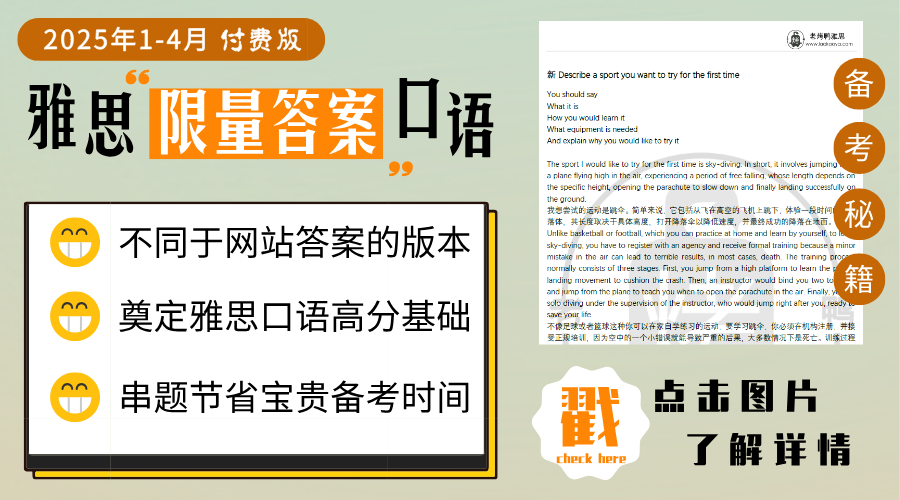雅思写作大作文范文 雅思写作同意与否 文学与历史literature and history
今天我们雅思写作大作文范文的文章来研究下文学与历史。小编记得自己从小学开始就有国际名著的阅读任务。像双城记、雾都孤儿这一类的小说都是在那时候看的。与此同时,我们也在学习各种各样的文言文,如宋定伯抓鬼等。但似乎有些国家不是这个样子的。他们在小学,甚至初中阶段只会学习本国的文学和历史,可能在高中和大学才会接触到别的国家的内容。那么我们在学习的时候究竟是应该将本国的文学和历史放在第一位呢?还是优先学习他国的文学和历史呢?老烤鸭小编搜集了一篇相关的考官范文,以供大家参考。
点击查看雅思写作教育类话题思路总结,了解更多切入点和论述方式
雅思写作大作文题目
Some people believe that it is more important to teach children the literature and history of their own country, rather than the literature and history of other countries. To what extent do you agree or disagree?
一些人认为教给孩子他们本国的文学和历史比教给他们其他国家的文学和历史更加重要,在多大程度上你同意或者不同意这一观点?
雅思写作大作文范文
People have different views about the teaching of national versus global literature and history in schools. Personally, I support the idea that children should study first and foremost the great books and historical events of their own countries.
人们对于在学校里应该教授本国的文学和历史还是全球的文学和历史持有不同意见。个人角度来看,我支持这一观点,即学生应该将学习他们自己国家的伟大书籍和历史事件放在首位。
There are several reasons why I believe that schools should focus on teaching national literature and history. Firstly, children enjoy learning about where they live, and by studying the ideas, culture, and history of their own countries they begin to develop a sense of identity. At the same time, this approach is appealing to parents, who studied the same books and historical events and can, therefore, help their children with school work. English children, for example, read Shakespeare and learn about the Battle of Hastings just as their parents did, and there is educational continuity across the generations. This translation is from Laokaoya website. Finally, an emphasis on national literature and history gives educators a narrower teaching scope, making curriculum design an easier task.
我出于以下几个原因认为学校应该重视教授本国文学和历史。首先,学生喜欢了解他们居住的地方。通过学习他们自己国家的观念、文化和历史,他们开始产生某种认同感。同时,这种方法更加适合父母。他们曾经学习同样的书籍和历史事件,并因此能够在他们孩子的作业上提供帮助。例如,英国的孩子像他们的父母一样阅读莎士比亚,了解黑斯廷斯之战。这样在代际之间就有了教育的连续性。最终,强调本国的文学和历史使教育者教授范围变窄,使得课程设计相对较为容易一些。
By contrast, the study of global events and foreign novels could cause unnecessary difficulty and confusion for school pupils. For example, I do not see the point in presenting Russian or Chinese history to a British child who has not yet studied the history of his or her own country in detail. Surely the child would be more able to comprehend historical events that took place in London than those that happened in Moscow or Beijing. Similarly, any exposure to international literature is likely to require the teaching of a foreign language or the use of translations. Young people at primary or secondary school age are simply not ready for such complications.
相比之下,国际事件和外国小说的学习可能在小学生中引起不必要的困难和困惑。例如,我看不到这样子做的意义,即给还没有仔细学习过自己国家历史的英国儿童讲授中国或者俄国的历史。孩子理解起发生在伦敦的历史事件一定比那些发生在北京或者莫斯科的事件更为简单。相似的,任何对国际文学的接触可能要求教授一门外语或者使用翻译。小学或者初中的人们还没有为这些复杂的情况做好准备。
In conclusion, I would argue that it is undesirable for schools to cover aspects of foreign history and literature; they should ground their pupils in the local culture instead.
总的来说,我认为学校教授外国历史和文学是不受欢迎的,他们应该为他们的学生在本国文化方面打下坚实的基础。
点击查看雅思写作高分范文,快速提升雅思写作成绩


